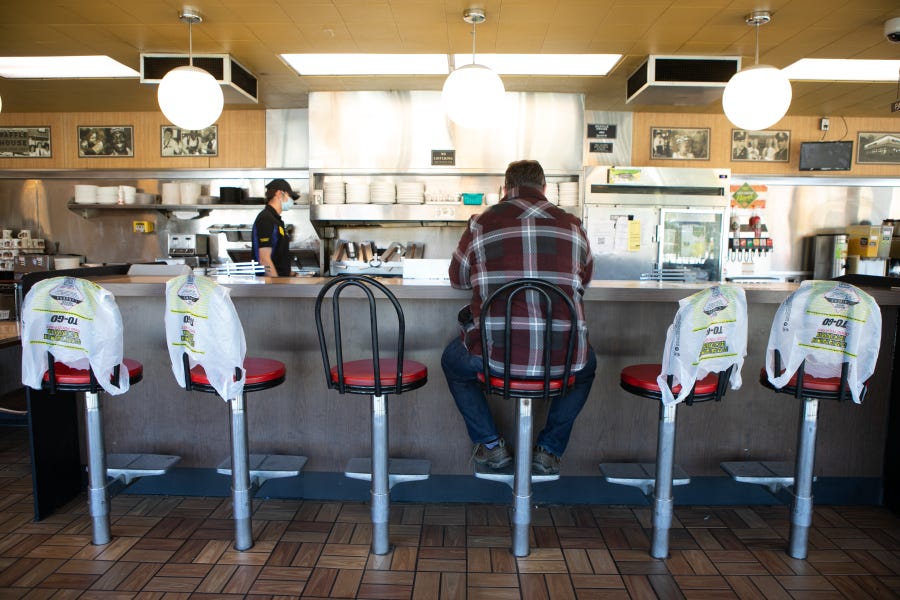President Trump announced Tuesday that he would be signing an executive order to help Tyson Foods to “solve any liability problems where they have certain liability problems” after the board chairman John Tyson took out full-page ads in Sunday’s New York Times, Washington Post, and Arkansas Democrat-Gazette to warn that “[t]he food supply chain is breaking.”
Tyson expressed concern about plants being forced to close, workers getting sick, and disruptions to the supply chain. It isn’t the only company concerned about current or potential lawsuits as several states across the country start to allow businesses to reopen. As the president has encouraged some schools to open before the end of the school year, Francisco Negrón, chief legal officer for the National School Boards Association, has been ringing the alarm that “if schools reopen too quickly and end up spreading the coronavirus, schools could find be held legally liable.”
Even as stay-at-home orders are lifted, some businesses may be hesitant to reopen if faced with the possibility of litigation from employees or customers. The risk of a large adverse court judgment can be especially daunting as consumer demand is likely to be slow to return for many businesses as polls show that the vast majority of Americans are hesitant to return to their pre-pandemic routines.
A team of lawyers from Alston & Bird LLP has created a helpful litigation roundup that includes summaries of new lawsuits around the country and notes that “[w]orkplace-related suits, including complaints accusing businesses of exposing workers or customers to COVID-19, are also continuing to increase with many more likely to follow.”
During an interview with The Dispatch’s Advisory Opinions podcast, Steve Lehotsky, executive vice president and chief litigation counsel for the U.S. Chamber Litigation Center, emphasized that clarity and consistency around potential legal liability would be a key factor that businesses would consider before reopening. He also highlighted that for many of those businesses that have been able to function remotely—accounting, consulting, and law firms and many tech companies, for example—the potential for litigation would be especially disincentivizing and yet those companies’ offices are often vital in supporting other economic activity like office cleaning services, coffee shops, lunch spots, and dry cleaners.
Overall, Lehotsky noted that businesses would be considering a host of factors when looking to reopen and rehire workers but that stronger legal protection for those companies that followed the advice of public health experts would speed the recovery.
Larry Kudlow, the director of the National Economic Council, had earlier hinted that the White House was considering asking Congress for help on the liability issue. “We want small businesses to have some confidence that if they do reopen, they’ll stay open,” he said last week.
But Congress may not need the nudge.
Majority Leader Mitch McConnell has already been ramping up his own rhetoric on the issue. On Monday, he warned that “[t]he next pandemic coming will be the lawsuit pandemic in the wake of this one.” In a press release from his office, he argued that the country is “asking everyone from front-line health care professionals to essential small-business owners to major employers to adapt in new ways and keep serving” but that “a massive tangle of federal and state laws could easily mean their heroic efforts are met with years of endless lawsuits.”
Sen. Ben Sasse is especially concerned about health care workers. He told The Dispatch, “The virus economy is pretty good for toilet paper companies and trial lawyers—two businesses covered in crap (apologies to the honest folks at Procter & Gamble). Bottom line: The heroes are the medics in the ambulance, not the trial lawyers chasing it. The doctors and nurses who are fighting this virus now shouldn’t need to worry about fighting in court later. We ought to be passing some emergency liability protections for these frontline health workers.”
But Rep. Justin Amash, who just announced he was forming an exploratory committee for a possible presidential bid, disagreed. On Monday, he tweeted that “The reasonable approach is for states to give businesses more flexibility to determine how to safely operate, while still subjecting them to ordinary liability. … I don’t know what [McConnell’s] proposing, but I do know that potential liability is something businesses should have to consider as they design safe workplaces.”
McConnell told Fox News’s Neil Cavuto on Tuesday that while the Senate discusses the next round of legislation, “We have a red line on liability…it won’t pass the Senate without it.”
As for what specific legislation would look like, many questions still remain about which types of businesses would be protected and whether they would have an affirmative defense against all lawsuits that allege anything short of gross negligence, which would require a plaintiff to show that a company showed an intentional and reckless disregard for the safety or lives of others.
There’s also a question about what level of care non-essential businesses, in particular, should be required to adopt.
Neil Bradley, executive vice president and chief policy officer for the U.S. Chamber of Commerce, wrote a letter urging “federal, state, and local governments to refrain from converting public health and safety guidance into regulations that may add further challenges for businesses to reopen” by allowing government entities to enforce fines “when they find a sneeze guard out of place, an employee using the wrong mask, or two employees five feet ten inches apart, not the mandated six feet.”
Photograph by Jessica McGowan/Getty Images.








Please note that we at The Dispatch hold ourselves, our work, and our commenters to a higher standard than other places on the internet. We welcome comments that foster genuine debate or discussion—including comments critical of us or our work—but responses that include ad hominem attacks on fellow Dispatch members or are intended to stoke fear and anger may be moderated.
You are currently using a limited time guest pass and do not have access to commenting. Consider subscribing to join the conversation.
With your membership, you only have the ability to comment on The Morning Dispatch articles. Consider upgrading to join the conversation everywhere.